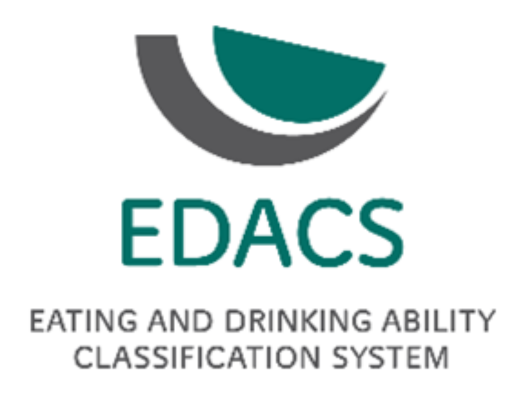Difficulties may occur in the development of walking, speech, and hand function. The movements involved in biting, chewing, and swallowing are frequently affected. Children and young people with cerebral palsy may have problems eating enough food to grow and to stay healthy because it is challenging to move their mouths to eat and drink efficiently. Some of them will have problems with frequent chest infections because particles of food or drink enter their lungs when they swallow. These difficulties continue throughout their lives.
We developed the Eating and Drinking Ability Classification System (EDACS) for people with Cerebral Palsy. EDACS describes five distinct levels of ability using the key features of safety and efficiency:
- Level 1 - Eats and drink safely with efficiency
- Level 2 - Eats and drinks safely but with some limitations to efficiency
- Level 3 - Eats and drinks with some limitations to safety; there may be limitations to efficiency
- Level 4 - Eats and drinks with significant limitations to safety
- Level 5 - Unable to eat or drink safely - tube feeding may be considered to provide nutrition

EDACS descriptions and illustrations
EDACS has been tested to see how easy and reliable it is when used by speech and language therapists and parents.
EDACS is the product of an independent research project funded for three years by the National Institute of Health Research (NIHR), under its Research for Patient Benefit Programme (Grant Reference Number PB-PG-1208-18144). The views expressed are those of the authors and not necessarily those of the NHS, the NIHR or the Department of Health.
Information about EDACS
- development and reliability of EDACS - Sellers et al, 2013
- developmental medicine and child neurology video podcast
- plain English summary
- a common data language for clinical research studies: the National Institute of Neurological Disorders and Stroke and American Academy for Cerebral Palsy and Developmental Medicine Cerebral Palsy Common Data Elements Version 1.0 recommendations
- The Eating and Drinking Ability Classification System for cerebral palsy: a study of reliability and stability over time
- reliability and validity of the Eating and Drinking Ability Classification System (EDACS) for children with cerebral palsy in Taiwan
- mini-EDACS: Development of the Eating and Drinking Ability Classification System for young children with cerebral palsy
- development of Mini-EDACS podcast DMCN
- Implementing EDACS with adults with Cerebral Palsy and their families- Plain English Summary
Download EDACS
We are collaborating with teams around the world to translate EDACS into different languages. Please contact us if you are interested in translating EDACS into another language that is not listed. On completion, the different language versions will be available to download from this site.
Development of Mini-EDACS – 18 months to 3 years
Mini-EDACS - Eating and Drinking Ability Classification System for young children with cerebral palsy
We have successfully developed the Mini-EDACS – an extension of the EDACS suitable for use with very young children with Cerebral Palsy, aged 18 months to 36 months.
We have:
- Refined content of Mini-EDACS with reference to videos and assessment data of children with Cerebral Palsy aged 18–36 months recorded systematically over time
- Revised and confirmed content of Mini-EDACS through an international Delphi Survey
- Tested reliability of Mini-EDACS when used by therapists and parents
Mini-EDACS provides a universal way of classifying and communicating eating and drinking abilities of young children with Cerebral Palsy.
We received a grant of from Nutricia Advanced Medical Nutrition to complete the study.
The study received ethics approval from the Health Research Authority reference: 17/LO/1557 Project ID: 229819.
Other functional classification systems
- Gross Motor Function Classification System
- Manual Ability Classification System
- Communication Function Classification System
- Viking Speech Scale
Useful links
Get in touch
If you are interested in finding out more about EDACS, please email Diane Sellers on

